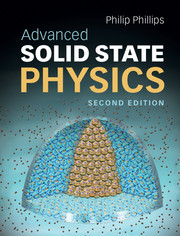Book contents
- Frontmatter
- Contents
- Preface
- 1 Introduction
- 2 Non-interacting electron gas
- 3 Born–Oppenheimer approximation
- 4 Second quantization
- 5 Hartree–Fock approximation
- 6 Interacting electron gas
- 7 Local magnetic moments in metals
- 8 Quenching of local moments: the Kondo problem
- 9 Screening and plasmons
- 10 Bosonization
- 11 Electron–lattice interactions
- 12 Superconductivity in metals
- 13 Disorder: localization and exceptions
- 14 Quantum phase transitions
- 15 Quantum Hall and other topological states
- 16 Electrons at strong coupling: Mottness
- Index
- References
12 - Superconductivity in metals
Published online by Cambridge University Press: 05 June 2012
- Frontmatter
- Contents
- Preface
- 1 Introduction
- 2 Non-interacting electron gas
- 3 Born–Oppenheimer approximation
- 4 Second quantization
- 5 Hartree–Fock approximation
- 6 Interacting electron gas
- 7 Local magnetic moments in metals
- 8 Quenching of local moments: the Kondo problem
- 9 Screening and plasmons
- 10 Bosonization
- 11 Electron–lattice interactions
- 12 Superconductivity in metals
- 13 Disorder: localization and exceptions
- 14 Quantum phase transitions
- 15 Quantum Hall and other topological states
- 16 Electrons at strong coupling: Mottness
- Index
- References
Summary
In this chapter we focus on the phenomenon of superconductivity and the Bardeen–Cooper–Schrieffer (BCS) (BCS1957) theory behind it. Superconductivity obtains when a finite fraction of the conduction electrons in a metal condense into a quantum state characterized by a unique quantum-mechanical phase. The specific value of the quantum-mechanical phase varies from one superconductor to another. The locking in of the phase of a number of electrons on the order of Avogadro's number ensures the rigidity of the superconducting state. For example, electrons in the condensate find it impossible to move individually. Rather, the whole condensate moves from one end of the sample to the other as a single unit. Likewise, electron scattering events that tend to destroy the condensate must disrupt the phase of a macroscopic number of electrons for the superconducting state to be destroyed. Hence, phase rigidity implies collective motion as well as collective destruction of a superconducting condensate. The only other physical phenomenon that arises from a similar condensation of amacroscopic number of particles into a phase-locked state is that of Bose–Einstein condensation. There is a crucial difference between these effects, however. The particles that constitute the condensate in superconductivity are Cooper pairs, which do not obey Bose statistics. In fact, it is the Pauli principle acting on the electrons comprising a Cooper pair that prevents the complete mapping of the superconducting problem onto a simple one of Bose condensation.
- Type
- Chapter
- Information
- Advanced Solid State Physics , pp. 189 - 257Publisher: Cambridge University PressPrint publication year: 2012



